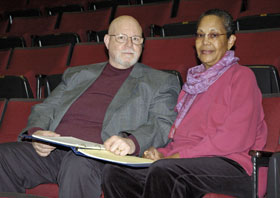Playwrights’ Recent Work Focuses
On Prudence Crandall School
 |
| Carlton Molette, professor of dramatic arts, and his wife Barbara, review the script for their new play about a 19th-century Connecticut school for black girls, in the Nafe Katter Theatre. |
|
Photo by Dollie Harvey |
About 12 years ago, Carlton and Barbara Molette were staying at a local motel while looking for a house to buy.
“It was shortly after I was hired by the University,” says Carlton Molette, professor of dramatic arts and senior fellow of the Institute for African American Studies. “We picked up a stack of brochures, and came across information about the Prudence Crandall School in Canterbury.”
The Molettes visited the school, read about it, and “decided it had enough drama to have potential for a play,” he says.
The resulting drama, Our Short Stay, directed by Carlton Molette and produced by the M Ensemble Theatre Company with support from the National Endowment for the Arts, was performed this month for the first time at the African Heritage Cultural Arts Center in Miami.
Prudence Crandall, a white Quaker, had founded the private school, which was attended by the white daughters of local gentry, in 1831.
When she allowed a black girl, Sarah Harris, to attend classes, the act “unleashed a firestorm of bigotry,” Molette says. After most of the white students withdrew from the school, Crandall closed it and reopened it as a school for black girls in 1833.
State lawmakers almost immediately enacted legislation known as the Black Law, which required schools to obtain local permission before educating black children. Crandall was arrested and tried for violating a law that was created for the purpose of closing her school. She and her students went through three trials, the last of which was dismissed by a judge. But violent attacks on the school, including a fire, forced it to close after 17 months.
Our Short Stay focuses on two students who attended Crandall’s academy: Julia Ward Williams and Sarah Harris Fayerweather. The play includes three actors who portray 23 different people. As they change characters, the actors put on or take off small articles of clothing, such as hats and shawls.
Carlton and Barbara Molette extensively researched the play, reading books and letters from the Connecticut Historical Society. Molette says they “spent many hours in the house getting a sense of where it was located in reference to other places mentioned in the literature.”
Carlton Molette says the easy part of the project was reading the books. The hard part was “trying to translate the historical research into something that can hold an audience’s attention.
“We have sought to retain the spirit of the historical truths discussed in the play, while compressing the actions of several people over their entire adult lives into one evening of theater,” he says. “We wish to honor the lives of the people featured.”
The play’s Miami audience included inner-city students from fourth through ninth grade, mostly African Americans and immigrants of color, Molette says.
“I hope Our Short Stay puts one more piece of fuel on the fire to inspire students to get a formal education,” he says. “They need to realize how important it is. I hope they’re inspired by what these women were willing to sacrifice in order to get that education.”
The first public reading of the script was presented in 2003 at the National Black Theatre Festival in Winston-Salem, N.C. The executive director and producer/general manager of the M Ensemble Theatre Company attended the reading and decided to seek support to present the play as a Black History Month outreach program in Miami. The play was also performed as a reading at the Frank Silvera Writers’ Workshop at the Harlem Theatre Company in New York.
The Molettes have written another play, Prudence, based on the same historical research as Our Short Stay, but focusing on the woman, Prudence Crandall. There will be a reading of the play at UConn in May.
Barbara Molette is a professor emerita at Eastern Connecticut State University. She and Carlton Molette are both members of the Dramatists Guild. They have collaborated on plays, scholarly papers, workshops, articles, and a book, Black Theatre: Premise and Presentation, now in its second edition.

